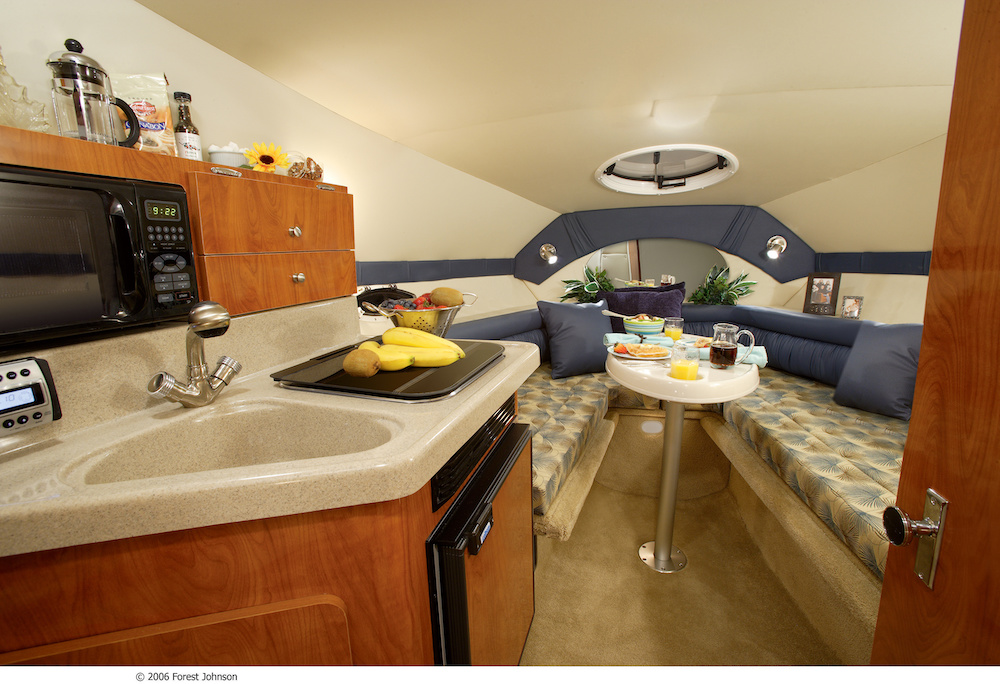It’s easy to romanticize the idea of living on a boat full-time; however, it's an alternative lifestyle like that takes preparation, organization and an ability to roll with changes. When you commit to moving aboard, make checklists of necessities and talk to your partner about deal-breakers. Prepare the boat for life aboard well before you make the move.
 Factors to Consider Before Living Aboard
Factors to Consider Before Living Aboard
Before moving onboard your boat, you should ask yourself some questions:
- Is this just for a period of time before you go cruising or is this a lifestyle choice?
- Are you comfortable with repeatedly defending your choice to your friends and family?
- Are you living in a climate that is boat-friendly year-round?
- Are you handy and a good problem solver?
- Who will accept your Amazon deliveries and are you ready to grocery shop frequently since there won’t be room to stow much?
- Are you ready to become your own maid?
- Will you feel comfortable with your kids being in this new environment?
- What’s Plan B if it doesn’t work?
After moving aboard, you may be hauling the laundry to the laundromat or groceries from the parking lot with no dock cart nearby. You’ll need to go to the pump-out station regularly as well as to the post office for your mail. Small doesn’t translate to easy so mentally run through a typical week and write down solutions to the issues.
Essentials: Stowage, Comfort & Connectivity
When you move from a 2,000-square foot house to a 40-foot boat, all the closets are smaller, the cupboards are fewer and there’s no two-car garage. In preparation, you’ll need to de-clutter kitchen gadgets, tools, mementos and clothing. Keep winter clothes in off-boat storage and your business attire at the office if possible.
Make sure the boat is warm and dry with plenty of ventilation. Mildew and condensation will become a part of life and you’ll need a whole new set of cleaners and tools.
Plan your connectivity needs. Whether a dish for TV or high-speed internet access via the marina WiFi, you’ll need a connectivity solution so you’re not cut off from work, friends, family and entertainment.
Beneficial Skills to Have for Living Onboard
Maintenance on a boat may be worse than in a house in terms of frequency and specificity. Basic plumbing, electrical and mechanical skills will be needed because boat systems are generally less reliable than their household counterparts. The alternative is calling a contractor for every issue.

Cost of Living on a Boat
Don’t assume that you’ll save money by moving aboard. Here's some expenses you may incur by living on your boat:
- Boat mortgage payment
- Slip fees
- Boat insurance
- Waste management
- Gas
- Food and water
The best way to manage expenses is by making a budget and sticking to it. Depending on the size and value of the vessel, boat insurance may be just as expensive as house insurance. Property taxes will usually be less as will electricity since you’ll not be heating/cooling/lighting as big a space. You’ll probably save money on waste management, gas and water as well.
Where costs rise dramatically is maintenance. Marine parts and labor are usually more expensive—sometimes 20% more, than typical household counterparts. If you take on the tasks yourself and you’re self-employed, every hour you spend working on your boat is an hour you don’t make money.
Learn More in our Boat Insurance Guide
Safety & Security
You’ll need to decide whether to invite strangers inside, and if kids and pets will be safe around the docks. Install CO2 and smoke alarms and a propane sniffer, check the fire extinguishers periodically, and keep an eye on the basics like bilge and battery levels. You may also want to consider the following:
- Will you be safe walking from the parking lot to the slip at night?
- Will your nice car be okay outside the garage 24/7?
- Who will call you if your boat starts to list when you’re on vacation?
There aren’t really more or fewer safety issues, just different kinds.
Daily Life & Socialization
Socializing is easier in a marina than in a neighborhood. Neighbors help neighbors in marinas but it’s a two-way street so be ready to lend a hand when needed. If you’d rather live anonymously, consider an end tie in the forgotten corner of the marina. Although there are challenges to living on a boat, if you’re prepared, you may find it a perfect fit.
FAQs
I already have a boat in a slip in a marina, so can I just move aboard?
Most marinas require an application for you to move aboard permanently. In some areas, liveaboards aren’t permitted or there are long waiting lists. Liveaboard slip fees are usually higher and your insurance rates may increase if your boat becomes your primary residence.
How do I live aboard a boat with a pet?
Dogs, cats and other pets need to acclimate to their new environments. They need exercise, private space and easy access to food and a potty. Make sure stairs and docks are safe for them and that they know how to get on the boat or dock if they fall in the water. Be careful of small spaces where they can get trapped and wires they can chew. Teach them about their new environment and be patient.
Learn more in Boating with Pets and Tips for Taking Your Dog Boating.
Looking for more information on boat ownership? Read...
- Boat Owner's Guide
- Costs of Boat Ownership
- Boat Maintenance Guide
- Insuring Your Boat
- Boat Safety Guide


